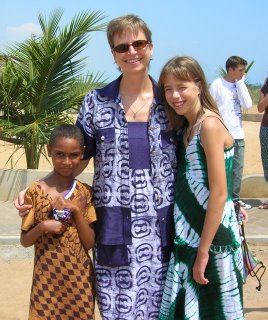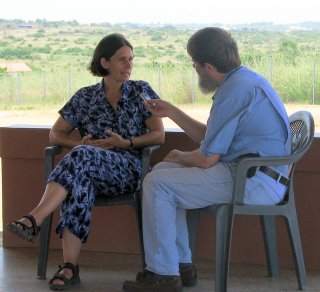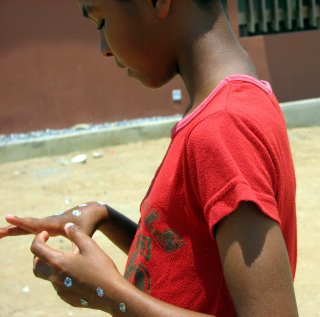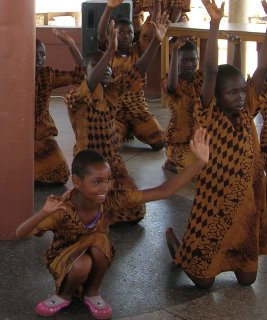We are Rich, We are Poor (by Suzanne)

[Gloria, Suzanne & Anna at Prampram's 8th Anv. Celebration]
We have so much money, for obvious reasons. We live in a nice house (with hot water and AC!), in a nice neighborhood, with a car (albeit borrowed), and guards, and someone to help clean our house, and plenty of food – we even waste food sometimes, which is, you know, not polite, at the least, in a land of the hungry. “There are starving children in Africa” – Steve and I both remember that catch phrase from our childhoods. And there are hungry people here, or at least those with little – little clothing, little food (not near the food choices we have!), no electricity, dirt floors in their houses. There is no question we are well-off in this country.
However, our children attend probably the nicest and most exclusive school in Accra. Full of people on expense accounts. Many people whose children attend Lincoln have the tuition paid out of expense accounts (as we do – 2 of our 3 kids’ tuition is paid for by Fulbright, which is one of the reasons why the Fulbright grant was so wonderful for us). Others at Lincoln are just downright wealthy. So, it seems, most ex-pats (of the U.S. or some other country) or locals at Lincoln have generous means of living here – cars and drivers (some families have a car and driver just for their children; others have a car and driver for each child), DSL and DSTV (cable TV) in their homes, household help, generators for when the light is out. Which is fine with us, to each his own, definitely, but, kids being kids, there is a lot of “how come we can’t have…” And the answer is, frankly, well Fulbright is generous, but not THAT generous. Fox especially spends as much time at The Mormon Compound as he possibly can, where they have lots of good food (much of it American), a pool, internet and DSTV and generators and xbox and all the rest (and, I might add, VERY nice people – I’d like to hang our there too – who wouldn’t?).
[Anna's FIRST dance...and doesn't she look great!]
So, last Friday night the kids had a dance at school (all three – Anna’s first dance – she was SO excited, and had a great time) so Steve and I went on our second “date” since we’ve been here – we have been out to lunch before, while the kids were in school, and on our 20th anniversary we went our to dinner (which turned out to be a mosquito-fest), but this was our first evening out since early August without kids. Wanting to make the most of it, we went to what we had heard was generally regarded as the best French restaurant in Accra. And it was lovely – we had wine and Perrier and appetizers and main dish and dessert and decaf expresso/cappuccino and it was all fabulous. Our bill came and it was 800,000 cedis (about 90 dollars – with tip almost $100). Which was fine – it was a great evening with wonderful food and our first major splurge. But on the way home, we talked about how much money that was – perhaps a months’ salary for many of the workers at the restaurant, and with tip almost exactly a months’ salary of each of our guards, who work six 12-hour days a week. We got to thinking about what it would be to spend a month of our U.S. salary on one dinner – we decided it would be something like flying to Paris and eating at the finest restaurant in Paris and then flying back. And how we would absolutely condemn as grossly extravagant anyone who would actually do that. Yet, here we are, doing the equivalent in Ghana.
And, yet, we wonder what we will do when we give the car back in early December, or how we will cope with the heat when the light is out during the hot, dry season (i.e. should we buy a generator), etc. But, these are all really choices for us – we choose to live within our means, although we could dip into savings or live farther at the edge of our means if we really wanted to. But, for most Ghanaians, their lives are not their choice, but what the world has dealt them, their lot in life. How fair is that? It’s not. But, it is how it is. And in the meantime, we keep making our choices, to live in the upper class of society here, but our rationalization, I suppose, is that we choose to live near the bottom edge of the upper class. There really is no middle here – you are either rich or poor. You either have choices, or you do not. And I have always had choices. But there are those who have never really had much of any. That reality has reached a new level of clarity for me, these days.
The next day (today), after the expensive French restaurant, we went to Pram Pram, to the orphanage that we go to most Saturday mornings. This time I talked a bit with the director of the orphanage, and asked where these kids come from. “All over Ghana,” she says. I expect to hear about AIDS. Instead, she tells me that the mission (which is funded out of Germany) started as a mission to street kids in Accra. In fact, they still have a day center for street kids in Osu, not far from our house. The orphanage grew out of the realization that some of these kids had no functioning parents and really needed a living situation, a home. They started with 15 kids, 8 years ago. In fact, tomorrow we will go back for the 8th birthday party of the orphanage – there will be a service, and music, and dancing, and food. While we were there today I was asked at least 20 times, “Will you come tomorrow?”

[The Oprhanage Director being interviewed by George, from MercyShips]
The director told me that most kids have at least one parent alive, but they were on drugs, or mentally unstable, etc., but that just recently they have come to have true orphans as well, children whose parents had both died. But, that was not the original mission, just how it has evolved. She starts pointing out kids to me. “See, that one, his mother is a prostitute and didn’t want him, so we took him in as a baby.” “This one,” indicating a 2-3 year old boy walking by, “his mother was very depressed and tried to commit suicide while she was pregnant with him. They (the Ghanaian gov’t/social system) have no way of dealing with that, so they locked her in prison. Prison is no place for a pregnant, depressed woman.”

[Gloria, looking at her stickers]
“And you know Gloria, the fair-skinned one.” I know Gloria – she is always a delight. 9 years old, with a glow of joy about her face. “Those scars on her hands and feet - her mother did that to her, with boiling water.” I am shocked. Not just at the cruelty, which is of course shocking. But to Gloria? I watch her closely today, although I often spend time with her. She has the most beautiful eyes, and is so loving, and her face really does glow with joy. I see the scar on her hand, which I hadn’t noticed before (it is on her bad hand – she has a bit of palsy or something, so I had never noticed how yes, that does look like a burn). And, she always wears aqua-sock type shoes, but now that I look I see the scars poking out from the edges of the shoes. She has a deep and, now that I know her history, shocking, scar around one eye as well. How could any mother have done that to her? Beautiful, joyful Gloria.

[Gloria, dancing with the other kids to the song "I Can Only Imagine"]
Later, the kids practice a song that they will sing and dance for us tomorrow. I tear up as I watch them, and I can’t help but think that what this mission is all about is trying to give these kids some choices, some hope. Still maybe not what most kids in the States would have, but more choices and more hope than growing up as a street kid in West Africa. I really want Gloria (and Praise and John and Stephanie and Steven and Kudjo and Joshua and Sarah and Matthew and …) to have the kind of hope and choices that every child of God deserves, but don’t always get, because life just isn’t always fair.

0 Comments:
Post a Comment
<< Home